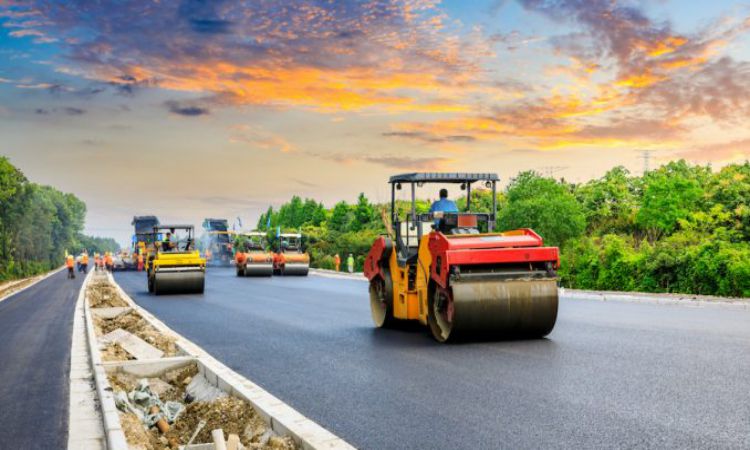 Asphalt is one of the commonly used paving materials—thanks to its resilience and durability. Most homeowners prefer using asphalt when installing their driveways because of this reason. Also, most state and federal governments in the United States prefer using asphalt when constructing roadways because of its durability and reliability. When installed properly, asphalt can last up to 25 years.
Asphalt is one of the commonly used paving materials—thanks to its resilience and durability. Most homeowners prefer using asphalt when installing their driveways because of this reason. Also, most state and federal governments in the United States prefer using asphalt when constructing roadways because of its durability and reliability. When installed properly, asphalt can last up to 25 years.
In most countries, asphalt is the most common paving option in different places like parking lots, driveways, roadways, and airport runways, among other uses. With that said, if you are searching for a durable paving option, then asphalt is your best option. In this post, we shall discuss the main benefits of asphalt paving. Read on for more information.
Safety
Generally, asphalt paved surfaces have high-skid resistance. In addition, it provides high color contrast between the road markers and surface, as a result, road users will have a better view of the road, regardless of the weather condition. Moreover, asphalt is not affected by snow and ice chemicals. Its dark color reduces glare, in addition to melting snow and ice faster, unlike other paving materials.
An open-graded asphalt is a form of asphalt that is utilized on road surfaces, helps to reduce spray and splashes during rainstorms. This, in turn, helps to reduce crashes on roadways. Besides, the nature of asphalt helps to eliminate potentially expensive and dangerous blowups on pavements.
Smooth
As a paving material, asphalt providers uniformed surfaces, unmatched by any other paving materials. Because rough and uneven surfaces cause driver weariness, in addition to affecting the stability of vehicles, smooth roads are safer.
The experts from CSG Sealcoating, Orlando say that smooth asphalt pavements lower rolling resistance—This is the coefficient of friction between the ground and the tires—this results in improved fuel economy and decreased carbon dioxide pollution. Smooth roads also increase traction for vehicles, and this leads to safer and also more enjoyable rides.
Affordability
When searching for paving material, there’s a possibility that you will be torn in between different materials—mostly asphalt and concrete. Although these paving materials come with numerous benefits, asphalt tops the list because of its cost-effectiveness.
Typically, the cost of installing an asphalt driveway or road depends on numerous factors. These factors include the size of the surface, current market costs for materials, geographical location, and the preparation work required, among other factors. All in all, asphalt paving will still be cheaper than other paving options—at times it can be half the price.
Now, the smooth surfaces produced by asphalt are not only safer but also save money. The reduced wear and tear on cars because of fewer bumps on the roads lowers the vehicle maintenance costs. Moreover, smooth roadways have an increased 25% lifespan and require less maintenance—which saves money in the long run.
Fast to install and to maintain
Asphalt roads and driveways don’t take long to install. And, since asphalt doesn’t need time to cure, motors can use the newly paved surface soon after the construction material is removed. That means there are fewer delays, as well as safer roads for users.
These aspects of asphalt mean roads can be quickly open and reinstated quickly. This plays a crucial role in road maintenance, as it helps to avoid unnecessary delays and inconveniences, especially when roads are closed for maintenance. Since asphalt paved surfaces don’t have any joints, it means they are not affected by the frequent freeze and thaw cycles experienced during the winter season—thus reducing the repair costs.
Another interesting thing with asphalt paved roads is that they can be easily upgraded when the traffic volumes increase. The existing asphalt paving can be strengthened by adding an overlay or through lane widening, instead of reconstructing the entire surface. This comes with another benefit—the asphalt road doesn’t need to be closed completely during such a project—it can remain partially open. Also, since asphalt doesn’t need a long curing time, the road can be re-opened quickly to keep the traffic flowing.
Asphalt is environmentally friendly
The good thing with asphalt is that it’s 100% recyclable. In America, the asphalt industry recycles and reuses 100 million tons of asphalt each year, and this saves an average of $2 billion every year. Moreover, asphalt uses 20% less energy to produce than other paving materials. Also, post-consumer waste, like used shingles and tires can be recycled and reused to pave new surfaces—this helps to reduce landfill space and conserve natural resources.
Durability
Asphalt paved surfaces are very durable. These surfaces are very flexible and have a bridging action—this allows them to withstand overloads without sustaining substantial damage. Moreover, the flexibility of asphalt paving means the surfaces can be designed to fit different traffic, materials, and soil conditions. And, asphalt requires periodic maintenance to stay in good condition.
Quiet
Highway noise causes distraction when driving and even at home. However, studies have revealed that asphalt paving can reduce roadway noise by up to 7 decibels. Just for reference, reducing noise by around 3 decibels is the same as doubling the distance between the source and the listener. Besides, asphalt paved surfaces reduce the need for unsightly and costly sound barriers—which cost around $2 million per mile.











